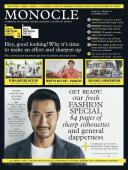
Issue 97
Hey, good looking! Why it’s time to make an effort and sharpen up. Plus: sartorial and investment tips from the fashion and retail sectors.
In This Issue
Oops! No content was found.
Looks like we no longer have content for the page you're on. Perhaps try a search?
Return Home

